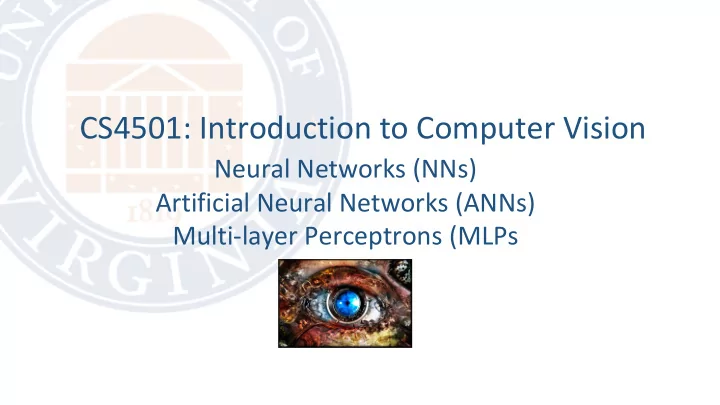

CS4501: Introduction to Computer Vision Neural Networks (NNs) Artificial Neural Networks (ANNs) Multi-layer Perceptrons (MLPs
Previous • Neural Networks The Perceptron Model • The Multi-layer Perceptron (MLP) • Forward-pass in an MLP (Inference) • Backward-pass in an MLP (Backpropagation) •
Today’s Class The Convolutional Layer • Convolutional Neural Networks • The LeNet Network • The AlexNet Network and the ImageNet Dataset and Challenge •
Convolutional Layer
Convolutional Layer
Convolutional Layer Weights
Convolutional Layer Weights 4
Convolutional Layer Weights 1 4
Convolutional Layer (with 4 filters) weights: 4x1x9x9 Output: 4x224x224 Input: 1x224x224 if zero padding, and stride = 1
Convolutional Layer (with 4 filters) weights: 4x1x9x9 Output: 4x112x112 Input: 1x224x224 if zero padding, but stride = 2
Convolutional Layer in pytorch kernel_size Input Output out_channels x kernel_size in_channels out_channels (equals the number of convolutional filters for this layer) in_channels (e.g. 3 for RGB inputs)
Convolutional Network: LeNet Yann LeCun
LeNet in Pytorch
SpatialMaxPooling Layer take the max in this neighborhood 8 8 8 8 8
LeNet Summary • 2 Convolutional Layers + 3 Linear Layers • + Non-linear functions: ReLUs or Sigmoids + Max-pooling operations
New Architectures Proposed • Alexnet (Kriszhevsky et al NeurIPS 2012) • VGG (Simonyan and Zisserman 2014) • GoogLeNet (Szegedy et al CVPR 2015) • ResNet (He et al CVPR 2016) • DenseNet (Huang et al CVPR 2017) • Inception-v4 ( https://arxiv.org/abs/1602.07261 ) • EfficientNet (Tan and Le ICML 2019)
Convolutional Layers as Matrix Multiplication https://petewarden.com/2015/04/20/why-gemm-is-at-the-heart-of-deep-learning/
Convolutional Layers as Matrix Multiplication https://petewarden.com/2015/04/20/why-gemm-is-at-the-heart-of-deep-learning/
Convolutional Layers as Matrix Multiplication Pros? Cons? https://petewarden.com/2015/04/20/why-gemm-is-at-the-heart-of-deep-learning/
CNN Computations are Computationally Expensive • However highly parallelizable • GPU Computing is used in practice • CPU Computing in fact is prohibitive for training these models
ILSVRC: Imagenet Large Scale Visual Recognition Challenge [Russakovsky et al 2014]
The Problem: Classification Classify an image into 1000 possible classes: e.g. Abyssinian cat, Bulldog, French Terrier, Cormorant, Chickadee, red fox, banjo, barbell, hourglass, knot, maze, viaduct, etc. cat, tabby cat (0.71) Egyptian cat (0.22) red fox (0.11) …..
The Data: ILSVRC Imagenet Large Scale Visual Recognition Challenge (ILSVRC): Annual Competition 1000 Categories ~1000 training images per Category ~1 million images in total for training ~50k images for validation Only images released for the test set but no annotations, evaluation is performed centrally by the organizers (max 2 per week)
The Evaluation Metric: Top K-error Top-1 error: 1.0 Top-1 accuracy: 0.0 Top-2 error: 1.0 Top-2 accuracy: 0.0 True label: Abyssinian cat Top-3 error: 1.0 Top-3 accuracy: 0.0 Top-4 error: 0.0 Top-4 accuracy: 1.0 Top-5 error: 0.0 Top-5 accuracy: 1.0 cat, tabby cat (0.61) Egyptian cat (0.22) red fox (0.11) Abyssinian cat (0.10) French terrier (0.03) …..
Top-5 error on this competition (2012)
Alexnet (Krizhevsky et al NIPS 2012)
Alexnet https://www.saagie.com/fr/blog/object-detection-part1
Pytorch Code for Alexnet • In-class analysis https://github.com/pytorch/vision/blob/master/torchvision/models/alexnet.py
Dropout Layer Srivastava et al 2014
What is happening? https://www.saagie.com/fr/blog/object-detection-part1
SIFT + FV + SVM (or softmax) Feature Feature Classification extraction encoding (SVM or softmax) (SIFT) (Fisher vectors) Deep Learning Convolutional Network (includes both feature extraction and classifier)
Preprocessing and Data Augmentation
Preprocessing and Data Augmentation 256 256
Preprocessing and Data Augmentation 224x224
Preprocessing and Data Augmentation 224x224
True label: Abyssinian cat
Other Important Aspects • Using ReLUs instead of Sigmoid or Tanh • Momentum + Weight Decay • Dropout (Randomly sets Unit outputs to zero during training) • GPU Computation!
VGG Network Top-5: https://github.com/pytorch/vision/blob/master/torchvision/models/vgg.py Simonyan and Zisserman, 2014. https://arxiv.org/pdf/1409.1556.pdf
BatchNormalization Layer
Questions? 40
Recommend
More recommend